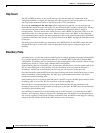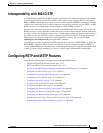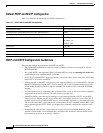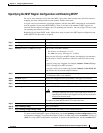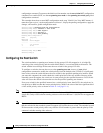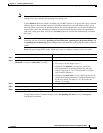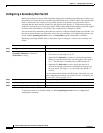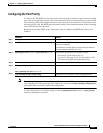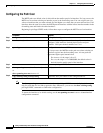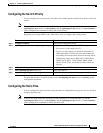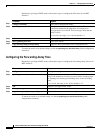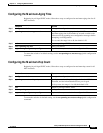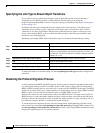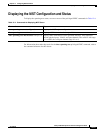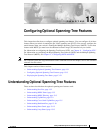
12-18
Catalyst 2950 Desktop Switch Software Configuration Guide
78-14982-01
Chapter 12 Configuring RSTP and MSTP
Configuring RSTP and MSTP Features
Configuring the Path Cost
The MSTP path cost default value is derived from the media speed of an interface. If a loop occurs, the
MSTP uses cost when selecting an interface to put in the forwarding state. You can assign lower cost
values to interfaces that you want selected first and higher cost values that you want selected last. If all
interfaces have the same cost value, the MSTP puts the interface with the lowest interface number in the
forwarding state and blocks the other interfaces.
Beginning in privileged EXEC mode, follow these steps to configure the MSTP cost of an interface:
Note The show spanning-tree mst interface interface-id privileged EXEC command displays information
only for ports that are in a link-up operative state. Otherwise, you can use the show running-config
privileged EXEC command to confirm the configuration.
To return the interface to its default setting, use the no spanning-tree mst instance-id cost interface
configuration command.
Command Purpose
Step 1
configure terminal Enter global configuration mode.
Step 2
interface interface-id Enter interface configuration mode, and specify an interface to
configure. Valid interfaces include physical ports and port
channels. Valid port-channel numbers are 1 to 6.
Step 3
spanning-tree mst instance-id cost cost Configure the cost for an MST instance.
If a loop occurs, the MSTP uses the path cost when selecting an
interface to place into the forwarding state. A lower path cost
represents higher-speed transmission.
• For instance-id, the range is 0 to 15.
• For cost, the range is 1 to 200000000; the default value is
derived from the media speed of the interface.
Step 4
end Return to privileged EXEC mode.
Step 5
show spanning-tree mst interface interface-id
or
show spanning-tree mst instance-id
Verify your entries.
Step 6
copy running-config startup-config (Optional) Save your entries in the configuration file.



